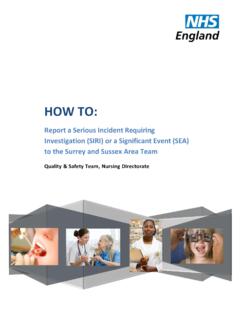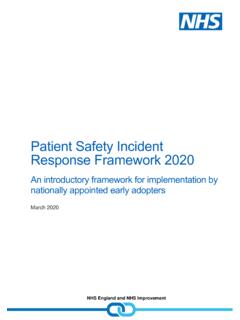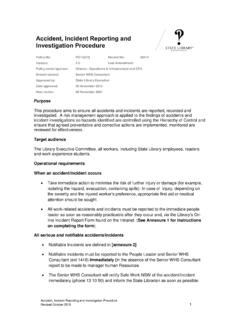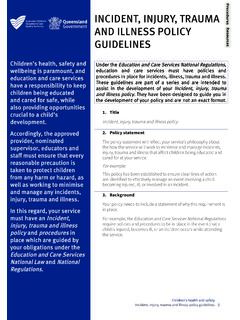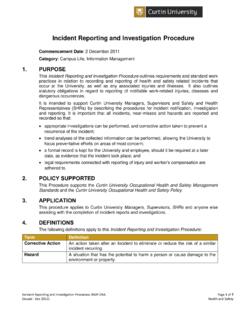Transcription of Child Safeguarding Practice Review Panel: practice guidance
1 Child Safeguarding Practice Review Panel: Practice guidance April 2019 2 Contents Who is this guidance for? 3 About this guidance 4 Introducing the panel 6 Our approach to system learning 7 Our operating principles 9 How the Panel works 10 Preparation for Panel meetings 10 Panel decisions and records of meetings 10 The role of the Secretariat 11 Communications 11 The data we collect 12 Information requests 12 Notification of serious incidents 13 Is it serious ? 13 Rapid reviews 14 Rapid Review timescales 15 The quality of serious case reviews 16 serious case reviews and publication 18 The interface with other statutory processes 19 Commissioning national reviews 20 3 Who is this guidance for?
2 This Practice guidance should be read by local Safeguarding partners, Local Safeguarding Children Boards (LSCBs) and their partners. It will also be of interest to all senior leaders and frontline practitioners involved in Child Safeguarding , as well as the relevant inspectorates. The guidance is particularly aimed at those involved in local Child Safeguarding Practice reviews and serious Case Reviews (SCRs), including reviewers, Review panel members and those responsible for decision making around reviews. 4 About this guidance This guidance is issued by the Child Safeguarding Practice Review Panel (the Panel) and supersedes that set out in Edward Timpson s letter of 4 July 2018.
3 It should be read alongside the relevant statutory guidance set out in Working Together to Safeguard Children (2018) (Working Together (2018)), Working Together: transitional guidance (2018) and Working Together to Safeguard Children (2015) (Working Together (2015)), parts of which remain in force until September 2020. As set out in chapter 4 of Working Together (2018), and paragraph of Working Together: Transitional guidance (2018), Safeguarding partners and LSCBs should have regard to any guidance that the Panel publishes. Working Together (2018) or (2015), and the transitional arrangements set out the legislative and statutory framework under which the Panel and Safeguarding partners and others operate to safeguard and promote the welfare of children.
4 This guidance from the Panel: sets out details about the Panel, how it has worked to date since its inception and its Practice principles; offers some early insights into patterns of activity across England, and commentary on the quality of rapid and SCRs seen to date; explores the new opportunities provided by the introduction of rapid reviews, and how this can identify and disseminate new learning quickly. The guidance starts by introducing the Panel members. The first months of its operation have generated data on the spread, quality and quantity of rapid reviews, the operational and qualitative issues of SCRs, and the complexity and uncertainty of the Practice context.
5 The Panel was established under the Children and Social Work Act 2017 and operates under the relevant legislation and statutory guidance . The Panel has the power to commission reviews of serious Child Safeguarding cases and to work with local Safeguarding partners to improve learning and professional Practice arising from such cases. We are very interested in working with Safeguarding partners and their partners over time, to realise the benefits of the new Safeguarding arrangements set out in the Children and Social Work Act 2017. The Panel has an important challenge function which it exercises both with local Safeguarding partners and with government.
6 From these first months of operation, the Panel is clear that many of the cases are complex and, in some cases, there is no definitive right answer to the debates about whether or not an SCR or local Child Safeguarding Practice Review should be undertaken, or the circumstances in which it is 5 not appropriate to publish a final Review . As we have seen these can be nuanced and challenging decisions for partners to take. In all instances, the decision as to whether to undertake a learning Review should be informed by whether a Review would be able to identify improvements to Practice . We have a real opportunity to make a positive improvement to how the Child Safeguarding system in England operates.
7 Children and families involved in the Child Safeguarding system and the general public rightly expect there to be improvement through change, and it is our collective responsibility to make this happen. We look forward to developing our relationship with the newly emerging Safeguarding partners across the country, so we can make this ambition a reality for children. 6 Introducing the panel The Panel became operational in June 2018. Although funded by the Department for Education and accountable to the Secretary of State for Education, we act independently from Government. We are independent from regulatory bodies like Ofsted, the Care Quality Commission and Her Majesty s Inspectorate of Constabulary and Fire and Rescue Services.
8 The Panel currently comprises eight members, including the Chair. Panel members, except the Chief Social Worker, are appointed through the Centre for Public Appointments procedure. All members are appointed by the Secretary of State for Education for a term of three years. The Chief Social Worker is a standing member of the Panel (ex officio). We come with very diverse professional backgrounds and have extensive professional expertise across a range of disciplines. Most of us have long-standing operational experience within the multi-agency network with responsibilities for Safeguarding children, including children s social care, police, health and schools.
9 Our individual current roles and expertise are set out here. 7 Our approach to system learning We want to use local and national Child Safeguarding Practice reviews to bring about changes that will lead to an improved Practice system for children and families and a reduction in Child abuse and neglect. We recognise that because of the nature of maltreatment, children may die or be seriously harmed even when Practice is exemplary, and often despite the good work that is being done by practitioners. Nevertheless, we recognise that there is always room for learning and improvement, and that there are situations where errors or failings by individuals, or within the system itself which may contribute to or compound the harm suffered by victims of maltreatment.
10 We have a system in England that is rightly considered one of the most effective in the world in Safeguarding vulnerable children. It is a system in which we can have confidence and practitioners within it should feel confident about their skills and expertise. Equally, no system and no practitioner can be perfect and there needs to be sufficient embedded humility to ensure there is the capacity and capability for learning and improvement. SCRs and local Child Safeguarding Practice reviews should seek to understand both why mistakes were made and, critically, comprehend whether mistakes made on one case frequently happen elsewhere and understand why. This is evidence of system failure.










